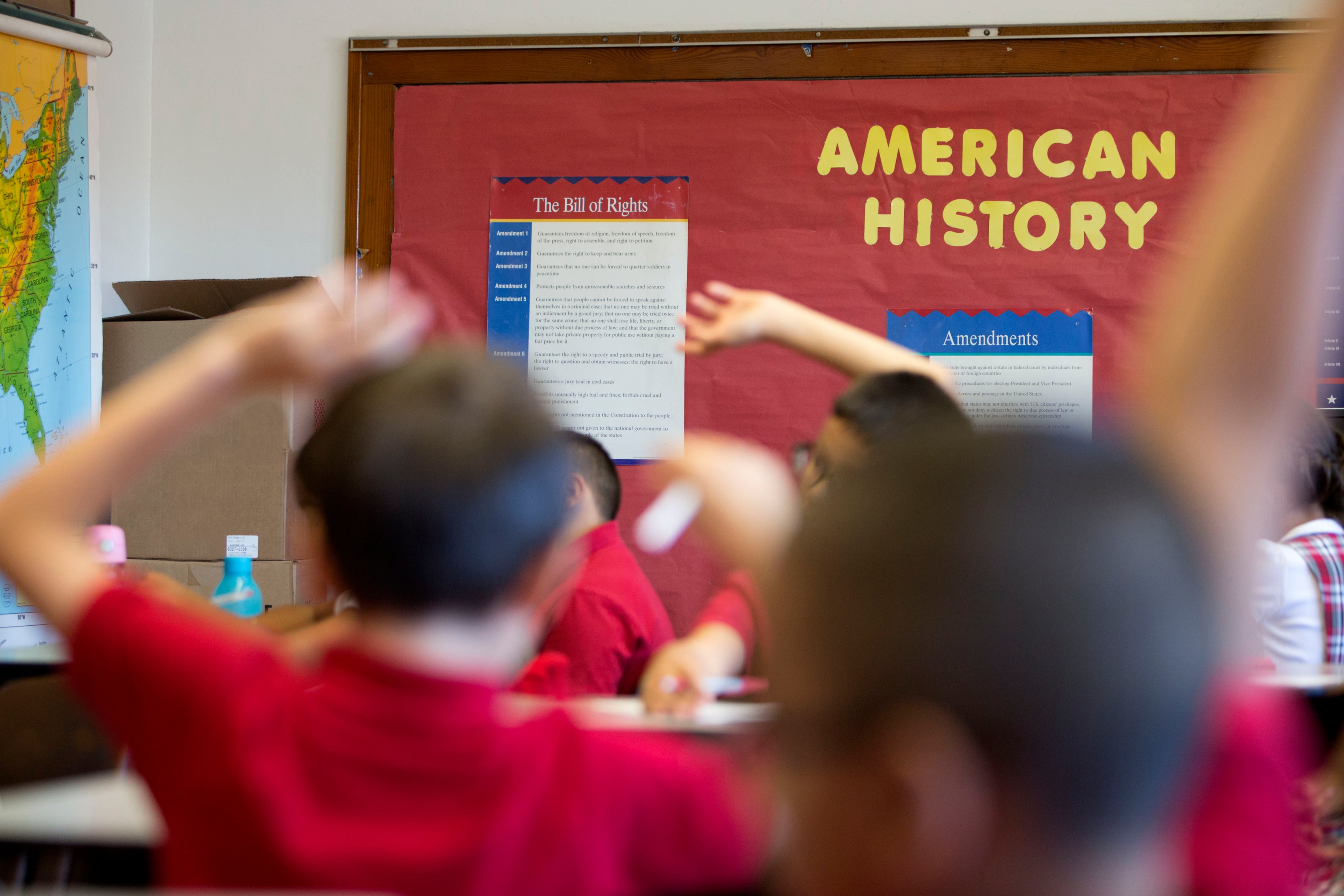Screaming, beatings, train whistles, and tearful goodbyes in Yiddish as officers split families apart.
Those were the sounds of the Holocaust remembered by survivor Ellis Lewin. He was 7 when Nazis took him to the concentration camp at Auschwitz.
Lewin died last year but his story lives on in a video that Michigan social studies teachers watched Wednesday during a webinar called “Remembering the Holocaust: Never Forget to Never Repeat.”
The webinar kicked off a professional development series that state Superintendent Michael Rice hopes will help fill the gaps in social studies education that he believes resulted from harmful federal policies beginning in 2002. That’s when the government rolled out President George W. Bush’s signature education law, the No Child Left Behind Act.
NCLB aimed to establish high standards, measure progress through standardized testing, and improve student performance in reading and math, and use harsh penalties to hold school accountable for student performance.
Reading and math scores did rise, particularly among students of color. But Rice and other critics of the law say that improvement came at the expense of a well-rounded curriculum.
Rice wants to recover some of that lost ground, beginning with social studies, and that starts with providing teachers guidance and access to solid teaching materials that have been vetted by historians like Anne Piontkowski and Rick Schaffner of the Zekelman Holocaust Center, who led Wednesday’s seminar.
Their aim is to provide tools for teachers to lead robust classroom discussions that put historical events into context.
Those conversations are “crucial and critical to further learning, not only about the Holocaust, but other aspects of social studies that we want our young people to know about as they move into the adult world as part of an active part of society,” Piontkowski told the 115 webinar participants — mostly middle and high school teachers.
The webinar series continues in June with a presentation on a guide from the Confederation of Michigan Tribal Education Departments for teaching about the history and contributions of indigenous people. Future seminar topics include the Civil Rights movement, Asian immigration, and citizenship. All sessions will sharply focus on Michigan social studies standards, organizers said.
The professional development effort is just one piece of a plan that also includes an effort to diversify reading material across disciplines so students can see themselves represented in books, Rice said.
“I see these as related: diversity in literature and comprehensive history instruction,” Rice said. “We’re preparing our young people to enter a diverse world, to navigate a diverse world.”
The renewed effort comes against a backdrop of a vigorous national debate over how schools teach about racism. The conflict has led to Republican calls to ban books, prescribe how the history of slavery is taught, and require teachers to publicly post lesson plans.
The debate has also flared in Michigan, where members of the state Board of Education argued at a meeting Tuesday over whether white supremacy still exists and how students should be taught about it.
These conflicts were not the impetus for the webinar series, but organizers say they kept them in mind during planning sessions.
“We’re teaching kids what really happened,” said Nick Orlowski, president of the Michigan Council for History Education and director of school leadership for the charter school management company CS Partners. “That means that kids are going to learn about sexism, and racism, and ableism. We’re trying to raise empathetic, understanding, caring believers in democracy.”
He said the training and support are welcome at a time when history teachers around the country feel under attack and many states are restricting how race and gender topics are taught.
Rice said educators “have the responsibility to teach this full breadth of history, including about race, racism, xenophobia, sexism, and other difficult and challenging subjects.”
Professional development on the Holocaust and attempts to erase indigenous culture can translate to teaching about racism and other fraught topics, too, said Bob Kefgen, spokesman for the Michigan Association of Secondary School Principals.
“If teachers are better prepared and better equipped to have crucial conversations with students it can defuse some of the concerns being raised,” he said. Rice hopes the webinar series will deepen teachers’ understanding of issues, invigorate their lesson planning, and help them connect historical moments in ways that resonate deeply with students.
He wants teachers to move away from chronological teaching of history and toward a holistic approach.
Instead of grouping together major historical events of the 1920s — passage of the 19th Amendment, the opening of King Tut’s tomb, Charles Lindbergh’s flight across the Atlantic, and the start of the Great Depression — lessons could be taught thematically, Rice said.
For example, teachers could design lesson plans around the women’s suffrage movement, including its beginnings in the 1840s, disagreements over whether suffragettes also should fight Black disenfranchisement, and ways the movement changed democracy.
“It will help students understand multiple perspectives of history and be able to explore those perspectives,” said Rebecca Bush, president of the Michigan Council for the Social Studies, which helped design the webinar series.
Teachers can register now for the June 29 webinar, “Maawndoonganan: Using the Indigenous-Developed Social Studies Resource Guide to Teach To and About First Peoples.”
Tracie Mauriello covers state education policy for Chalkbeat Detroit and Bridge Michigan. Reach her at tmauriello@chalkbeat.org.






